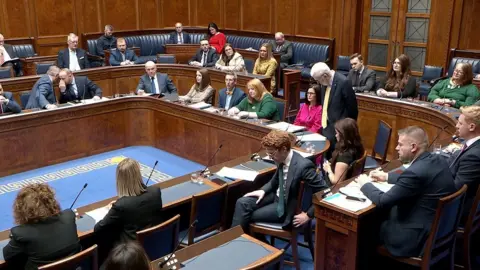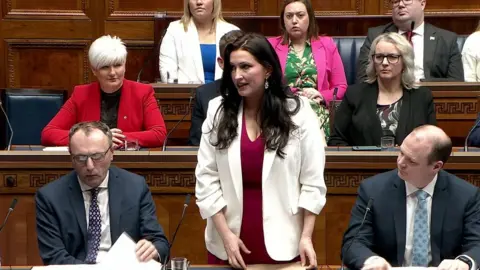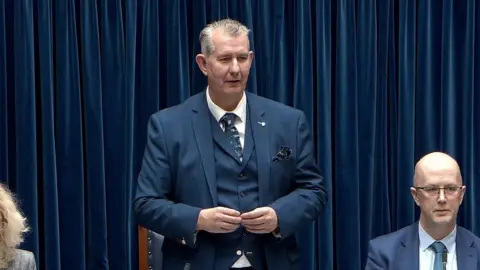Northern Ireland: Michelle O’Neill makes history as nationalist first minister

Sinn Féin’s Michelle O’Neill has made history after she was appointed Northern Ireland’s first nationalist first minister.
The DUP’s Emma Little-Pengelly has been appointed deputy first minister.
The return of power-sharing follows the Democratic Unionist Party (DUP) ending its boycott over post-Brexit trade rules.
Ms O’Neill said she was “sorry for all the lives lost during the conflict – without exception”.
Northern Ireland’s devolved government was restored on Saturday – two years to the day since it collapsed.
 Northern Ireland AssemblyMembers of the Northern Ireland Assembly are in the chamber to nominate ministers
Northern Ireland AssemblyMembers of the Northern Ireland Assembly are in the chamber to nominate ministers
The DUP had boycotted the devolved government for two years.
But, after striking a fresh deal with the government over post-Brexit checks on goods going between Northern Ireland and Great Britain, they agreed to go back into power-sharing.
Under power-sharing rules, the devolved government in Northern Ireland can only operate on a cross-community basis with the involvement of both unionists and nationalists.
Similar to the cabinet at Westminster, the Northern Ireland Executive is the decision-making body for Northern Ireland and has powers to legislate on many areas.
After Ms O’Neill and Ms Little-Pengelly were nominated as first and deputy first ministers, the following took up roles as ministers in the executive:
- Justice Minister: Naomi Long, Alliance
- Economy Minister: Conor Murphy, Sinn Féin
- Education Minister: Paul Givan, DUP
- Communities Minister: Gordon Lyons, DUP
- Health Minister: Robin Swann, Ulster Unionist Party (UUP)
- Infrastructure Minister: John O’Dowd, Sinn Féin
- Finance Minister: Caoimhe Archibald, Sinn Féin
- Agriculture, Environment and Rural Affairs Minister: Andrew Muir, Alliance

Sinn Féin’s Aisling Reilly and the DUP’s Pam Cameron will serve as junior ministers in the executive office.
The Social Democratic and Labour Party (SDLP) – the fifth-largest party in the assembly, with eight assembly members – did not qualify to be part of the executive and instead has gone into opposition.
SDLP assembly member Matthew O’Toole said the party wanted to make the institutions “work effectively for the people of Northern Ireland”.
What did Michelle O’Neill say as first minister?
In the last assembly election in May 2022, Sinn Féin became the largest party at Stormont for the first time, entitling the party to nominate the first minister.
Although the first and deputy first ministers hold a joint office and have equal power, Ms O’Neill becoming first minister is seen a landmark moment for Irish nationalism.
Addressing the chamber, she said it was “a historic day” which represented “a new dawn”.
The prospect of a nationalist first minister “would have been unimaginable” to her parents’ generation, she added.
The first minister said that, despite her views on the future constitutional position of Northern Ireland, she would “serve everyone equally” and promised inclusivity and respect for all as they “deliver and work together” as the public “rightly demands”.
“To all of you who are British and unionist – your national identity, culture and traditions are important to me,” she added.
History delayed is not history denied.
After almost two years, Michelle O’Neill’s moment has finally arrived.
She’s no longer first minister in waiting and can now take her place in history as the first nationalist to hold that office.
In a place where symbolism matters, it is a significant day in Northern Ireland’s 103-year lifespan.
But with the new office comes new pressure as Michelle O’Neill has pledged to be a first minister for all.
To fulfil that promise she will have to move well beyond her comfort zone.
She has had two years to prepare so we can expect the new first minister to already have a number of firsts earmarked.
Rising to the office may be the easy part – rising to the task could be a much greater challenge.

 Northern Ireland AssemblyThe DUP’s Emma Little-Pengelly said she will “work tirelessly” as deputy first minister
Northern Ireland AssemblyThe DUP’s Emma Little-Pengelly said she will “work tirelessly” as deputy first minister
Mrs Little-Pengelly congratulated Ms O’Neill on becoming the first minister and said she will be diligent in the role.
She promised to “work tirelessly” to ensure they can deliver for all, as there is an opportunity to shape Northern Ireland for the better.
‘A great day for Northern Ireland’
Mrs Little-Pengelly said the path to a prosperous future can only be taken by walking that path together
“I love Northern Ireland. I am deeply proud to be from this place we call home despite our often troubled history and divisions of the past, I know that we have incredible potential,” she said.
The new deputy first minister said the assembly “must learn from the lessons of the last seven years, whatever path we are going to take”.
Northern Ireland Secretary Chris Heaton-Harris said the return of power-sharing was a “great day for Northern Ireland” and for “businesses, people and for the future of public services here”.
“I am extremely confident that this will be sustainable in the very long term,” he added.
Mr Heaton-Harris confirmed that a £3.3bn financial package is now available for the incoming executive.
In a statement, Tánaiste (Irish deputy prime minister) Micheál Martin said it was a “special day for the people of Northern Ireland”.
The Irish government “stands ready to support the work of the executive” in partnership with Westminster, he added.
What else happened at Stormont?
The first order of business was to elect a speaker, with former DUP leader Edwin Poots being voted into the role over Social Democratic and Labour Party (SDLP) assembly member Patsy McGlone and Steve Aiken from the Ulster Unionist Party (UUP).
Mr Poots said he would carry out his duties with “integrity and impartiality”.
 Northern Ireland AssemblyFormer DUP leader Edwin Poots has been elected as the new speaker of the assembly
Northern Ireland AssemblyFormer DUP leader Edwin Poots has been elected as the new speaker of the assembly
“Hopefully it will all go well,” the Belfast South assembly member said. “I truly hope that this assembly never is suspended again.”
Mr Aiken, Sinn Féin’s Carál Ní Chuilín and Alliance Party member John Blair were appointed as deputy speakers.
Alliance leader Naomi Long became justice minister once again.
That job is appointed on the basis of a cross-community vote, while the rest of the ministerial roles use the D’Hondt mechanism, which determines how many ministries each executive party is entitled to.
That led to Sinn Féin taking up three roles – Conor Murphy as economy minister; Caoimhe Archibald as finance minister; and John O’Dowd as infrastructure minister.
The DUP selected former first minister Paul Givan as education minister and Gordon Lyons as communities minister.
The UUP’s Robin Swann resumed his role as health minister – a post he held up until Stormont’s collapse in 2022 – and Alliance took the final role, Andrew Muir as minister for agriculture, environment and rural affairs.
Halfway through the process, there was one apparent hiccup, with Sinn Féin asking for a brief adjournment after Mr Givan’s appointment to education.
The party said the process was not going as it had anticipated.
However, after a few minutes, the process resumed and the rest of the ministers were decided.

What did people outside Stormont think?

Park runners pictured around Parliament Buildings on Saturday
Earlier on Saturday, a number of park runners were making their way around Parliament Buildings at Stormont – and were expressing both relief and anger at the return of power-sharing.
Teacher Hannah Gay was one of thousands of public sector workers across Northern Ireland who have taken part in industrial action over pay and conditions in recent weeks.
“I don’t get paid if go on strike,” Ms Gay said.
“They may be going back to Stormont, but for me, I’m still angry. It’s too little, too late.”

Lisa Burns says a big priority is for Stormont is to help sort out Northern Ireland’s health service and bring hospital waiting times down
Another runner, Lisa Burns from Belfast, told the BBC she is relieved to see assembly members taking their seats and said they have a lot of work to be getting on with.
“The first thing I want them to do is sort out our transport infrastructure,” she said.
“I’m here running alongside a lot of friends who work for the NHS and more investment is needed there – we have highest hospital waiting times than anywhere else in the UK.”

Health and education workers are protesting outside the parliament building
Meanwhile, public sector workers gathered at the front gates of Stormont’s parliament building to protest as part of their ongoing pay disputes.
The return of a Stormont executive should see the Treasury release a £3.3bn package earmarked to help struggling public services in Northern Ireland.
A number of strikes involving nurses, teachers, civil servants, and thousands more have taken place in recent weeks over pay and conditions.
Unite regional representative Kieran Ellison said the return of devolution is a “step in the right direction”.
“Now the politicians are off strike they can help us stop our strike action. We are here to be heard and find out if the money required to settle the dispute is available,” he said.
Source: BBC






